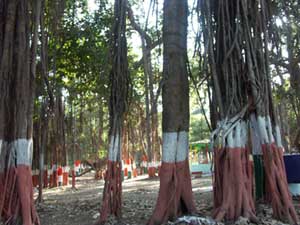Onwards to Kabirwad
Mar 14, 2005

As soon as the Dalai Lama went there, he decided to sit in silence for four hours straight. When Peace Mother visited, she said she hadn't seen a place like that in India. It was from the same place, the "prayer ground" at the Gandhi Ashram, that we departed.
Thirty-forty friends gathered at 7AM to pray together and to share in each other's merits. For having just showed up to India, without a rhyme or a reason, it felt like an incredible blessing. As twenty of us walked out, others split up on two sides to chant "Vaishnav Jan" to bid us goodbye.
Our plan was to take a bus to Jadeshwar, and walk to Kabirwad. Why Kabirwad?As the story goes, two brothers were seeking enlightenment. In hopes of gaining wisdom and finding a guru, Sukl and Tirth went to Kashi by foot. While both of them learned a lot, they didn't find a teacher who exemplified the traits they were looking for. When they reached home, they hit up another game plan: serve anyone that comes to our place as if they were our teacher. They had also brought home a branch of banyan tree, which they planted in the ground. One day, a holy man walked into the grounds. Like they did with everyone else, they served him; when they washed his feet, they poured that water into the banyan branch. The next day, that branch bore some leaves and Sukl and Tirth had found their teacher. Today, that place is known as Kibarwad.
When I was trying to explain the new paradigm of a movement and the relevance of decentralization in this world, Jayeshbhai promptly summarized it -- "Just like a banyan tree." Indeed. Banyan tree starts with a root but when any of its branches hit the ground, they become roots too. In a short period, it's impossible to figure out the original root, and it's also very difficult to remove a banyan tree.
So we decided to start at Kabirwad. After our decision, we had various occurences of Kabirwad in random ways, which further affirmed our place.
Sixteen of us walk to a local bus station. Some others drop us off in solidarity; couple of them cry with tears of joy. Three others are in a car with all our luggage, grains, cricket bats and things of the sort.
On the bus, I stand way up front; first thing I notice is an old man giving up his seat for a young man who was sitting on the bus floor, looking a little pale. With all the conversations, prayers, silence, and the spirit, everything feels right for me. Right place, right time, right thing.
Boarding the second bus is set to be a challenge. We ask the first bus and
We had to board a second bus, which was set to be a difficult task. But the first bus we inquire in, is the right bus. Sitting in front of us, is Ranchod-bhai (it's one of Krishna's names too) with a nonstop smile. And he tells us that he is getting off at the same exact spot as us and he'll guide us to Kabirwad. "Krishna is dropping us off," I thought myself.
Everything just fits in perfectly.
Ranchod-bhai gives Jayeshbhai his Gujarati newspaper and Jayeshbhai reads me a story of a group of people who went out and picked trash as a symbol of spreading the good word. At the next "tea stop", John started picking up a few pieces of plastic from the shop where Mark was drinking his Mazaa and within minutes, all of us were down on the ground, picking up the bits. At first, the shop keepers were amused but when they saw the whole place cleaned up in five minutes, they were a bit ashamed that they didn't do it themselves.
The bus goes on. We arrive at Jadeshwar, 12 kilometers away from Kabirwad. Our plan is walk in the 33 degree Celsius heat, with our caps and bandanas on our heads. Life is good. :)
We make friends on the way; the way makes friends with us. At each kilometer, we learn new things; obvious things become obvious again. Incessant city horns are absent, no one is in a hurry to get anywhere, chirping of the birds is heard, kids are playing without a worry, farm are in full harvest.
A little tired and a lot excited, we arrive at Kabirward. To get to the banyan tree, we have to take a 10 Rupee boat ride across the holy Narmada river. And we do.
At arrival, we have three items to secure -- shower, food and sleep. The river is good enough to bathe in, and we find an open spot by the temple to sleep under. We didn't know about the food, but we figure some door will open.
Nothing is certain; but certainty is nothing anyhow.

